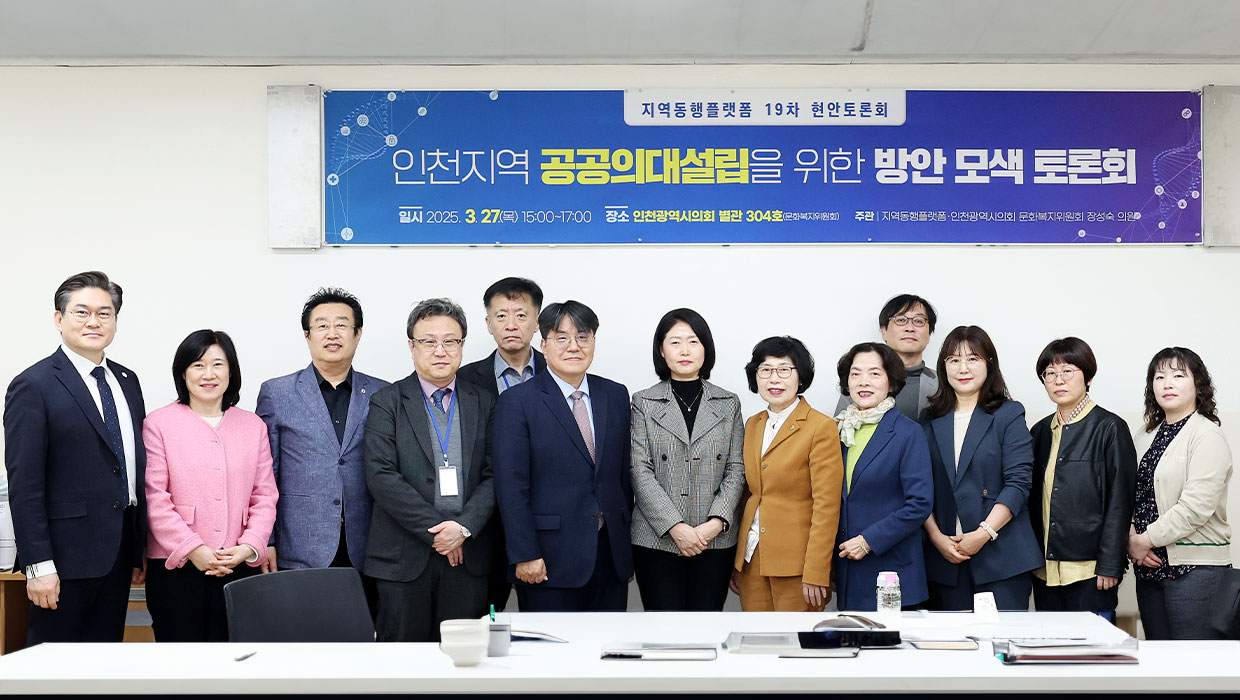Discussion on the Establishment of Public Medical College in Incheon
- 글번호
- 405233
- 작성일
- 2025-04-14
- 수정일
- 2025-04-14
- 작성자
- 홍보팀 (032-835-9490)
- 조회수
- 335

- Incheon University Research Institute for Local Companionship Platform19th Current Issues Discussion Meeting
- Incheon City, the council, experts, and universities are united in the justification for the establishment of a public medical school
- Incheon City plans to implement the establishment plan through cooperation with relevant ministries
Co-hosted by Rep. Jang Sung-sook of the Incheon Metropolitan City Council's Culture and Welfare Committee and Incheon National University's Research Institute for Local Companionship Platform, the "Discussion on How to Establish a Public Medical College in Incheon" was held at 3 p.m. on March 27 at the seminar room of the Culture and Welfare Committee in Annex 304 of the Incheon Metropolitan City Council.
The event, which was organized as the 19th current discussion on the Incheon University Research Institute for Local Companionship Platform, was organized by Jang Sung-sook, a member of the Cultural Welfare Committee of the Incheon Metropolitan City Council, to discuss mid- to long-term alternatives from a public medical perspective on the expansion of public medical care in Incheon and reverse discrimination in the Seoul metropolitan area.
The event was chaired by Rep. Jang Sung-sook and presented by Professor Lee Yong-gap of Talent University. Subsequently, there were discussions between Kim Dong-won (professor of public administration) of Incheon National University's Research Institute for Local Companionship Platform, Professor Im Joon of Inha University (medical school), Lee Hoon-jae, head of Incheon Metropolitan City's public health care group, and Lee Yoon-jung, education cooperation officer at Incheon Metropolitan City's planning and coordination office.
In his presentation, Professor Lee Yong-gap of Talent University proposed the establishment of a medical system for each responsible area, including the northwestern part of the metropolitan area, along with a public medical school that trains local doctors as a way to establish a public medical school. In addition, by training doctors in specialized fields reflecting regional characteristics, doctors in separate specialized fields such as infectious disease specialists and aviation and maritime emergency medical personnel were trained, and as a way to establish a clinical education hospital for public medical schools, a plan to cooperate with Incheon Medical Center with more than 800 beds was presented.
In the discussion, Kim Dong-won emphasized that the model of Japan's self-governing medical school is a model closer to solving problems in the public medical system and Korea's medical vulnerable areas than the local agenda based on interviews with doctors from Japan's self-governing medical school. Professor Lim Joon said that even if the local agenda is implemented, there are concerns about similar results to the current public health doctor system and public health scholarship doctor system, and that establishing a public medical school is a good idea as a policy to directly select, educate, and foster human resources. In addition, the establishment of a public medical college is a separate matter, and it would be a realistic way for the second medical center to create a vision that will create synergy in public hospitals beyond the perspective of using it as the establishment of a second medical center in Incheon. In addition, Incheon National University proposed a viable public medical school, and discussed the presentation with concerns about whether the inclusion of medical scholars is appropriate and the opinion that Incheon's public medical college viewed the northwestern part of the metropolitan area as a region, which should be viewed as a whole.
In the following discussion, Lee Hoon-jae suggested that if there are limitations that regional-centered public medical schools should be established in each region, discussions at Japan's self-governing medical colleges, which have greater benefits for public health care nationwide than local benefits, are the beginning of public medical schools. Finally, Education Cooperation Officer Lee Yoon-jung shared the situation in Jeollanam-do and discussed that Incheon City will continue to consult with the government and the National Assembly to shape the plan to establish a public medical school through cooperation with related ministries such as the Ministry of Health and Welfare and the Ministry of Education so that related bills can be passed as soon as possible.
Shin Kyung-hee, a member of the Incheon Metropolitan City Council who attended the debate, recently released a petition from residents raising the issue of emergency evacuation from a general hospital in connection with the death of an emergency patient in Socheongdo Island by missing the golden time, raising the urgency of public medical care in vulnerable areas.
Finally, Jang Sung-sook, a member of the Incheon Metropolitan City Council, organized a research meeting at the parliament level and discussed a lot so far, but summarized that the expansion of the discussion to a specific public medical model like today was the outcome of the debate, and said, "It is a very important time for continued support and interest so that Incheon City, local lawmakers, city councils, and social organizations can continue to move forward with a will to improve the essential medical environment together."

